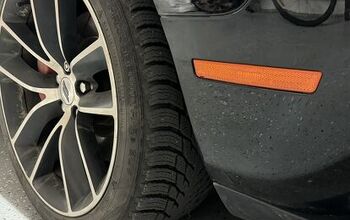Three Guys Discuss The Chinese Car Bubble Theory

Chinese dually. Picture courtesy transportfool.com
I spent an interesting Saturday with two old friends of mine. They had never met before. One, American, CFO of an insurance company, had been in the finance and banking business all his professional life. The other, born Chinese, naturalized American. Was one of the top mortgage writers in the Silicon Valley before the dotcom crash. Came back to China and heads a Chinese/American bank. The two got along splendidly.
Of course, we talked about money and cars. Recently, there was a discussion on TTAC on how the bursting of the Chinese real estate bubble would destroy the car market just like it had in the USA. I eagerly set out to pick their brains.
Quite oddly, the first one to throw water on the bubble theory was my friend, the staid CFO of the staid insurance company.
Need some cars to go with it? Picture courtesy newhomessection.com
Did the wealth effect, the feeling that you suddenly sat on a three million home that you had bought for $500,000 (with $100,000 down,) did that urge you to fill up that three car garage to its limit? No, said my friend, the staid CFO . Housing prices were relatively flat through the 90s while car sales increased. Car sales peaked in 2000, just when home sales started to skyrocket. Real estate taxes rose right with it, and those three cars turned into a liability. Car sales eased.
“Easy credit did cause the car and housing bubble. The credit crunch burst both bubbles. But the housing bubble was not the cause of the car bubble,” said my bean counting friend. If you look at the charts which I linked in this paragraph, you see that while doing it off the top of his head, he was right. The car boom in the U.S. preceded the real estate boom. Both crashed when the easy money was gone, or, as my beancounting friend put it, “when the hedge funds said to sell everything that’s not listed on the NYSE.”
He then went into a long monolog about high yield asset-backed-securities and credit derivatives that were en vogue with hedge funds. He did that much to the fascination of my Chinese friend, but I lost him.
About 60 skyscrapers in Beijing are vacant. Picture courtesy springcreekacq.com
When the discussion came to the Chinese real estate bubble, my Chinese banker friend emphatically acknowledged that China is in a huge one. Mostly in the tier one cities, but getting into the tier 2 cities also. He said that it is an absolute insanity. People buy homes and apartments, and keep them empty. Vacancy rates in tier one cities are sometimes higher than 30 percent. About 60 skyscrapers in Beijing are vacant. He congratulated me on my choice of renting, and suggested I should move, because rents are actually coming down. Caused by the oversupply of unsold properties, held for speculative purposes.
When they are poor, they take the bus or the train... Picture courtesy concierge.com
Coming to cars, my Chinese banker friend emphatically denied that easy money has anything to do with the skyrocketing car purchases in China. “That’s an American fantasy. Chinese don’t finance their cars. They pay with cash.” He told me how forays of his bank into the automotive financing field had failed, to the utter disbelief of his American partners.
The official party line is that “less than 20 percent of Chinese car purchases are financed.” My Chinese banker friend figures it might be less than 10 percent. “The number of financed cars is actually going down. Chinese don’t borrow to buy a car. When they are poor, they take the bus or the train. When they earn more, they buy a car.” He said that that Chinese increasingly earn more. About 25 percent of China’s 1.3b to 1.5b people are considered “middle class.”
… when they earn more, they buy a car. Picture courtesy popsci.com
Then, my Chinese fried mentioned the high savings rate of the Chinese, and that many of them don’t know where to stash their money. That got the fascination of my bean counting friend. They both bemoaned the lack of high yielding safe investments. When they started discussing yield curves, instead of the curves I am interested in, I lost them again.
We went for dinner, all three of us agreeing that in China, the boom in cars has nothing to do with the boom in real estate, that the two are much more disconnected than they ever were in the U.S., that the Chinese real estate market will go boom unless the government will intervene (very likely, as it is often state owned enterprises that are driving the prices up and are building the empty towers,) and that the car boom in China will last until the motorization has reached Western standards. In a country where cars aren’t financed, tight or easy money has little impact on car buying.
A level of motorization according to Western standards is about 600m cars away. So even if the Chinese would – horrors of horrors – buy 50m cars a year, instead of the 15-17m this year, China would have 12 years until the beginnings of a market saturation.
I asked both whether I should buy oil futures. They both shrugged, and we had the best Beijing duck in town.

Bertel Schmitt comes back to journalism after taking a 35 year break in advertising and marketing. He ran and owned advertising agencies in Duesseldorf, Germany, and New York City. Volkswagen A.G. was Bertel's most important corporate account. Schmitt's advertising and marketing career touched many corners of the industry with a special focus on automotive products and services. Since 2004, he lives in Japan and China with his wife <a href="http://www.tomokoandbertel.com"> Tomoko </a>. Bertel Schmitt is a founding board member of the <a href="http://www.offshoresuperseries.com"> Offshore Super Series </a>, an American offshore powerboat racing organization. He is co-owner of the racing team Typhoon.
More by Bertel Schmitt
Latest Car Reviews
Read moreLatest Product Reviews
Read moreRecent Comments
- 2ACL I won't miss it; it was decent at launch, but in addition to the bad packaging, GM did little to keep it relevant in the segment. I'd prefer that another domestic automaker doesn't just give up on the mainstream sedan, but unlike some of Ford's swan songs, the Malibu made an indifferent case for why they should live.
- ToolGuy TG grows weary of purchasing gasoline. I don't care so much how or why, I am just tired of it. I still buy petroleum products, not 'boycotting oil,' but backing away from gasoline where I can. Sample size = 1.
- Probert Maybe it's not too late for the Dodge Neon I've always dreamed of!!! To the keyboard Robin!
- Akear The malibu still outsells all GM EVs combinedMalibu -150,000GM EV's - 75,000Maybe this represents how execrable GM EVs really are. Barra should have resigned years ago,
- Fred Short term bean counters give up the market and long term players gain shares.






































Comments
Join the conversation
http://managingthedragon.com/?p=677
@Canucknucklehead Remember, Canada is in its own housing bubble: prices have gone up 89% since 2003, and believe me, the median income has not gone up 89%. The Cons passed those laws to try and slow things down a bit, but it is too little, too late. The bubble will eventually burst, and while the pain won't be as extreme as Ireland or America, the long hangover going to suck, especially since Canada's economic growth (with a few exceptions) has been based on expanding consumer debt rather then, y'know, economic growth. As for China, I don't understand all the speculation in real estate, and how it got so wildly out of control. There's a newly built city in Northern China that is empty because of real estate speculation. No one nearby can actually afford to live there.